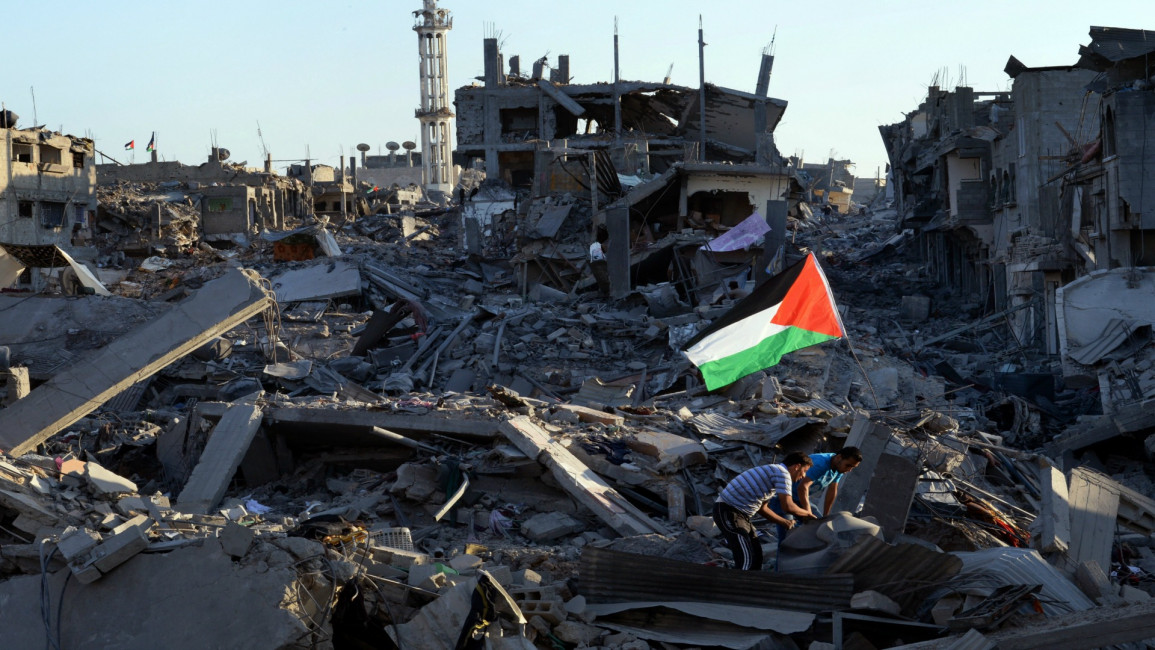
Will 2016 bring respite for Hamas and Gaza?
It is a decade since Hamas won a landslide victory in Palestinian legislative elections. Western and Israeli attempts to eliminate the movement have so far failed, but a status quo that Hamas long sought to avoid has emerged nonetheless, and with it has come a raft of challenges.
The major obstacles that existed in 2006, nationally, regionally and internationally, remain. So what are the chances of Hamas and Gaza improving their lot in 2016?
Hamas, with its 2006 mandate, presented the West with a problem. Hamas had won convincingly, but recognition of Israel and acceptance of the Oslo Accords were non-negotiable requirements if the West was to approve any Palestinian government.
And Hamas was never going to agree to these conditions.
Schism
Support for President Mahmoud Abbas, already the West’s man in Ramallah, was shored up to undermine the elected government. For the West, even a minor threat to Israel's hegemony could not be tolerated, and so democracy-promotion switched to democracy-prevention following the Hamas victory. Abbas and Fatah, knowing upon which side their bread was buttered, sided with the West.
Abbas offered a "non-violent" approach and had long recognised Israel. He showed great faith in US negotiators and in a policy of cooperation with occupation, believing it would eventually lead to concessions and independence. Hamas, meanwhile, had no such delusions.
Hamas, lacking experience and knowing that they were pariahs internationally, sought national unity, forming a short-lived coalition government with Fatah.
When Fatah sided with the West in an attempted coup, a schism was created that still dominates Palestinian politics today. Hamas has been the de facto government of the Gaza Strip ever since, and while it seeks national unity, Fatah, believing it holds the stronger cards, continues to collaborate elsewhere.
Regionally, the schism is devastating for Hamas, with international powers unwilling to back them while they remain unreconciled with the PA.
 |
The brief reign of the Muslim Brotherhood in Egypt offered Hamas some hope |  |
Regional changes
Egypt, Jordan, Saudi Arabia and the PA all work closely with Israel - relationships that could not withstand simultaneous close relations with Hamas.
The PA has even cracked down on peaceful protest by Palestinians under its jurisdiction, mirroring anti-democratic regimes in the region.
The brief reign of the Muslim Brotherhood in Egypt offered Hamas some hope, but no substantial change. Relations with Iran, Syria and Hizballah soured and remain fragile following Hamas leaders' quiet withdrawal from Damascus in protest at the Assad regime's violence against its own people.
Turkey and Qatar have filled the vacuum somewhat, but are too pragmatic to tip the balance of power in Hamas' direction.
Israel's approach, Hamas' response
Three major Israeli assaults on Gaza have failed to oust Hamas, and a new status quo has emerged. Gaza is Hamas' responsibility, but it is a burden, and the movement is limited by the restrictions of the stifling blockade.
Israel might be content to leave Hamas in place for now, keeping Gaza quiet, and delaying decisions on the issue of what to do with the Strip's 1.8 million inhabitants.
Ahead of last year's Israeli elections, Prime Minister Binyamin Netanyahu vowed to prevent the establishment of a Palestinian state. Until Israel feels some pressure, normalisation of the occupation will deepen.
PA collaboration with Israel ensures the occupation is low cost for Israel, and Netanyahu will look to make Israel stronger still with an eye on future negotiations.
"Nobody will make peace with a weak Israel," is his maxim.
The US also has little incentive to put any of its weight behind a weak, divided state. This all leaves Hamas trapped in Gaza geographically, and on the periphery, politically.
It is in this hostile context that Hamas' legacy after ten years is its remarkable survival in Gaza. It has sought a seat at the table, offering compromise but not abandoning of its political programme.
In agreeing to form a "national consensus" government in 2014, Hamas admitted the 2006 game was up. The government included none of its ministers - an American condition. Hamas sees itself in a fight for its existence and with the game rigged, its strongest hand is its refusal to play. The result has been stalemate.
Three possible scenarios for 2016
Hamas will continue to try to improve its position in 2016, and can choose from three approaches:
It could soften its stance towards the conditions imposed by the West and give way, allowing the West to dictate terms. In this scenario, the West will have achieved its 2006 aim of co-opting the movement.
Another pragmatic political approach would be to focus on improving relations with Europe through lobbying for removal from the European terrorist list. This would allow direct dialogue with the EU.
But as the primary funder of the peace process, Europe would take some convincing to allow a more independent actor such as Hamas on to the scene.
A more likely scenario is the continuation of the status quo.
Having invested so much political capital and having suffered so much to get to this stage, Hamas will not give it all up for unreasonable demands.
The West will remain hostile to moderate, democratic Islamists. Hamas, although cornered, can still make incremental improvements using legal, political and media tools to change perceptions and increase its influence.
 |
Any achievements will increase the credibility of Hamas' approach |  |
What Hamas wants
Hamas never sought to rule over a Palestinian enclave. It remains committed to national liberation and will insist that any agreement reflects the unity of Palestine. Tangible, albeit modest, rewards and the survival of Hamas as a political party are necessary if the West is to draw the movement in.
Reconciliation with Fatah is the political priority. Even more urgently Hamas will seek to end the siege on Gaza, welcome reconstruction of the territory and try to bring about implementation of the ceasefire agreed in 2014, which was never implemented by Israel.
Any achievements will increase the credibility of Hamas' approach. With Abbas' popularity chronically low, Hamas will not capitulate, nor will Abbas rush to open himself up to democratic judgement.
Hamas wants to be liberated from the burden of Gaza and its humanitarian crisis, and handing over responsibility to an effective Palestinian government while still retaining credibility and popularity would be a real triumph.
Hamas knows it would be a stronger player in that scenario, but, unlike in 2006, the West knows this too.
Tom Charles is a London-based writer, editor and literary agent. He previously worked in the UK parliament, including as a lobbyist for Palestinian rights. He has contributed to Jadaliyya and the Journal of Palestinian Refugee Studies. Follow him on Twitter: @tomhcharles
Opinions expressed in this article remain those of the author and do not necessarily represent those of The New Arab, its editorial board or staff.




